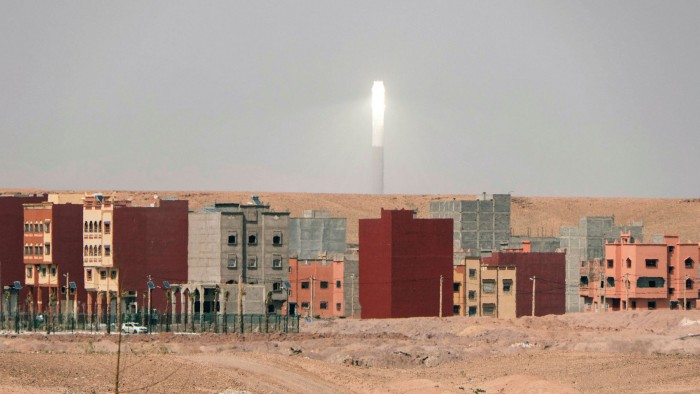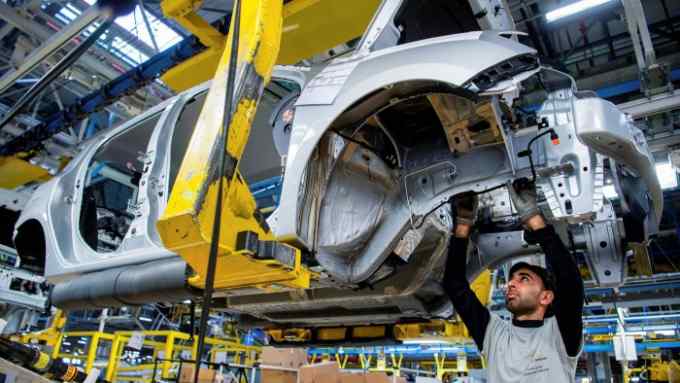Morocco asserts its power as diplomatic spats simmer

Simply sign up to the Middle Eastern politics & society myFT Digest -- delivered directly to your inbox.
At the centre of an instalment in Morocco’s giant Noor solar station in Ouarzazate stands a 243m tower. It houses a receptor that generates electricity from the sun rays, which are reflected on to it by 178 sq m of panels.
“Until a year and a half ago, we would have been in the presence of the tallest edifice in Africa — until the construction of the Grand Mosque Algiers [265m],” notes Mustapha Sellam, site director at Masen, the publicly funded company that runs the complex, during a visit.
But the primary motivation for the country’s push towards renewables, which began in 2009, was not so much to build record-breaking structures, as to reduce the kingdom’s reliance on oil and gas imports. Its oil-rich neighbour, Algeria, cut diplomatic relations on August 24, citing “hostile actions”.
While the north African rivals have very few economic links, this rift could result in the severing of a gas pipeline that delivers natural gas to Spain and Portugal via 500km of Moroccan land, and gives Morocco 7 per cent of the gas as a transit fee. The contract is set to expire on October 31.
This latest diplomatic spat marks a deterioration of already frosty relations between the two countries: tensions over the Western Sahara were reignited in December when former US president Donald Trump recognised Morocco’s claim over the contested territory. Algeria, meanwhile, backs and hosts Polisario, the movement demanding independence for the territory.
Washington’s move was a triumph for Morocco and part of a quid pro quo deal that required the normalisation of its diplomatic relations with Israel. This has also raised hopes — especially on the Moroccan side — for a possible economic exchange with Israel, says Riccardo Fabiani, project director of north Africa at International Crisis Group.
Following the US decision, however, which is in violation of international law, Morocco expected others to follow suit. This “led to a sense of emboldenment” and what Irene Fernández-Molina, lecturer in international relations at the University of Exeter, describes as “miscalculations” from Morocco.
While 23 mostly African countries have opened consulates in the Western Sahara since 2019, according to the Moroccan Ministry of Foreign Affairs, European countries — in particular Spain and Germany — have not shown a readiness to follow suit.
In the wake of Trump’s move, the Spanish foreign minister Arancha González Laya reaffirmed Spain’s position in support of a UN-brokered solution involving both sides. Then relations worsened further when Spain allowed Polisario leader Brahim Ghali into the country for medical treatment.
Similarly, Germany took a critical stance on the US’s move and called a UN Security Council meeting to discuss the matter. In March, Morocco cut contact with the German embassy in Rabat and recalled its own ambassador from Berlin in May over “antagonistic activism” on the Western Sahara issue.
For now, all German partnerships are on pause, including €300m pledged by Masen for a green hydrogen project. Another of Masen’s stations is located in the Western Sahara region of Laayoune.
More from this report
Pandemic exposes vulnerabilities in Moroccan economy
Morocco’s carmaking prowess a result of shrewd state planning
Critics flag opposition weakness in Morocco’s new parliament
Morocco tourism struggles despite vaccine progress
Moroccan lenders shore up small businesses but risks loom
Casablanca financial hub’s fortunes tied to national economic strategy
Analysts suggest all sides are trying to mend relations. “Overall, the economic interests in Morocco and the European interests in the stability of Morocco trump everything else,” says Fabiani.
European countries were recently given a reminder of their reliance on Morocco to ensure stability and control migration when a record 6,000 migrants — including 1,500 minors — were able to cross its border into Spain’s Ceuta enclave on a single day in May.
Relations with European countries are still positive, though. Moroccan and European representatives opted for a measured response to a EU court decision in September that ruled against the legality of trade and fishing activity in the Western Sahara under EU-Morocco agreements. That decision disputes the validity of the EU’s previous legal workaround in which it claimed to have the “consent” of the Sahrawi population.
“We remain fully mobilised to continue full co-operation between the EU and Morocco,” said Josep Borrell, EU high representative for foreign affairs and security policy, in a joint statement with Nasser Bourita, Morocco’s minister of foreign affairs.
There is a two-month period for lodging an appeal against the ruling. “They [Morocco and the EU] are avoiding a high-level diplomatic crisis like the one declared by Morocco in 2016,” says Fernández-Molina. “But it is a precarious situation and there needs to be a change in the [EU’s] approach since they can’t use the same creative solution as last time.”

Comments